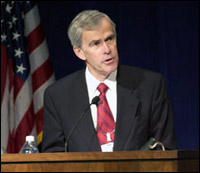He may hail from an energy state out West, and he may be a soft-spoken moderate, but Jeff Bingaman, Democratic senator from New Mexico and ranking member on the Senate Energy and Natural Resources Committee, has joined the sparsely populated ranks of members of Congress pushing for real progress on climate change.

Sen. Jeff Bingaman.
Photo: LeRoy N. Sanchez/Los Alamos National Laboratory.
During the recent energy-bill negotiations, he forged discussions with Energy Committee Chair and fellow New Mexican Sen. Pete Domenici (R) — long considered no friend of the environment — to devise a more flexible but still mandatory alternative to the McCain-Lieberman Climate Stewardship Act. Bingaman’s proposal would require industries to begin slowing the growth of their greenhouse-gas emissions through an emissions-trading program.
Though it garnered notable bipartisan support, the amendment failed to get out of committee. But Bingaman did manage to push through some other firsts: He sponsored the most aggressive renewable-energy standard ever passed in the Senate, requiring utilities to produce 10 percent of their electricity from renewables by 2020 (up from less than 3 percent today). And, on the symbolic front, he persuaded a majority of his colleagues to support a “Sense of the Senate” resolution that for the first time puts the Senate on record acknowledging humanity’s role in global warming and the need for federal mandates to curb the crisis.
Bingaman spoke with Grist‘s Amanda Griscom Little from his Washington, D.C., office last week about his cautious optimism and sobering concerns over America’s energy future.
Last month, the U.S. Senate overwhelmingly approved an energy bill that achieved a number of surprising firsts in the effort to curb the United States’ reliance on imported oil. Which of these, to you, were most notable?
Well, let me begin by saying that realistically our imports of oil are very large, and they will continue to grow. We hope they will grow less as a result of this bill than they otherwise would. What we’ve tried to do is both increase domestic production of energy — not just oil, but gas, coal, nuclear, and renewables — and find ways to use the energy we do produce more efficiently. Long term, we think that the effects of the bill will be significant, but by no means will it solve the problem of our dependence on foreign oil. We have to continue to find technologies that will help us solve that problem.
What are some of the specific provisions in the bill that would reduce demand for imported energy?
I sponsored a renewable-energy standard requiring utilities to produce 10 percent of their electricity from renewable-energy sources by 2020 that passed. Frankly, it is quite modest relative to the standards that some states have already adopted, but it still would be a substantial step forward for some parts of the country.
What about the provision that directs the president to reduce U.S. oil demand by one million barrels a day by 2015?
Well, that’s helpful, but frankly there’s no guarantee it will have results. What we’re doing there is directing the president to do it, but not specifying how he needs to do it, so obviously the test there is whether or not he follows through on that mandate and puts in place mechanisms to achieve that goal. I hope he does.
What are your biggest disappointments about the bill?
A big failure is that there is nothing in the bill that requires the administration to toughen [auto fuel-economy] standards.
There was some hope that you and Sen. Domenici would make concrete progress on mandatory climate-change legislation — an amendment based on National Commission on Energy Policy recommendations that would force companies to begin slowing the growth of their greenhouse-gas emissions. Why did that fail?
Yes, well, that points to another major failing in the bill. We have not done all we should to deal with the issue of climate change. We worked to see if we could get agreement on a proposal to impose a cap-and-trade system modeled after what the NCEP recommended, but the only thing we could get the majority to agree to was a “Sense of the Senate” resolution, which was a step forward, but a far cry from concrete legislation.
What got in the way of an agreement to impose a cap-and-trade system?
Questions were raised — and legitimate questions — about how the cap-and-trade system would function, how the allocation of emission permits would be done. Frankly, we didn’t have ready answers. And so what Sen. Domenici has agreed to is to have some hearings — at least one hearing in July, and additional ones this fall — at which we can hopefully come up with answers to those questions. Then we’ll be in a position to have a majority of our committee support some kind of initiative in this area.
It seems on some level that the climate issue is losing traction in Congress, considering last month’s overwhelming defeat of the McCain-Lieberman Climate Stewardship Act, which lost quite a few votes since the previous time it came to the Senate floor. You, in fact, consistently voted in favor of that act before you came out with a weaker version that drew support away from it.
You have to be realistic about the opposition to climate initiatives of any substance that we are facing. This is a very different Congress than it was [a few] years ago. The White House is resisting very strongly, and the Republican leadership in both houses is resisting very strongly. So we’re fighting an uphill battle. We’re still thinking we can win it, it just may take a little longer.
The energy bill offers billions in subsidies to encourage domestic oil production. Why does the oil industry need tax breaks right now when oil prices are as high as they are?
That’s a very good question. In the tax package, we tried to concentrate on incentivizing actions that wouldn’t occur without the tax breaks — that is, try to incentivize people to move toward more use of technologies that would conserve energy: hybrid cars, other technologies. The Senate bill would funnel a higher percentage than any tax package we’ve seen in the past toward efficiency and renewable-energy sources [in total, 40 percent of $18 billion in tax breaks over 10 years]. Politics is a balancing act.
Twice before, the Senate has sent an energy bill to House-Senate conference committee, only to see it fail. Are you girding for a challenging clash with the House?
I hope that it will be less challenging this time than it has been in previous congresses. Since this bill covers so many different subject areas and there are so many different parts to our energy picture, I think there is a critical mass of support for getting this thing across the finish line.
What will be the most contentious issues?
Obviously, [liability protection for producers of] MTBE has been and continues to be a subject of disagreement. I hope that we can get the House to agree to the renewable portfolio standard that we have adopted in the Senate, but we will have our work cut out for us.
Will the provision to allow drilling in the Arctic National Wildlife Refuge, which is in the House version, be a point of contention?
No, I don’t believe ANWR will. The Republican leadership has been open about their intention to add ANWR as an amendment to the [budget] reconciliation bill, which is expected to come up in the fall, and that way the ability to filibuster is not there.
President Bush will likely have to play a key role in resolving the sharp differences between the Senate and House versions. I know he has called on Congress to send him a final bill by August. Where can we expect the president to put his support?
I don’t think he’s really taken sides on a lot of issues that really divide the House and Senate.
What do you think of the leaps and bounds that are being made at the state and city levels on climate change — 171 cities have agreed to adopt Kyoto targets, California Gov. Arnold Schwarzenegger [R] is pledging a million solar roofs and 80 percent CO2 reductions by mid-century. Do these efforts prove that the political will is there to take measures far more aggressive than what’s being done federally?
Oh, I think the public is more willing to see aggressive measures taken than the Congress has been or than the president has been. And I think that what you’re seeing in local communities is a reflection of the fact that the public would like us to do something about this issue. So I hope that the administration and the Congress will wake up and smell the coffee here pretty soon.
Do you think they can do that by August?
No, I don’t. I think it’s going to take longer than that, it’s going to take something of an educational process here in the Senate, and I’m sure in the House and with the administration as well. We’re definitely not at the cutting edge of thinking on these issues.

